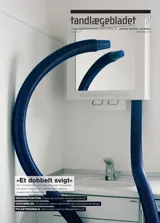Delvis rekonstruktion af zygoma-maksilkompleksetmed computer-designet alloplastisk implantat
Baggrund – Kraniedefekter blev tidligere behandlet ved hjælp af knogletransplantation eller osteotomi. En ny behandling involverer et patient-specifikt computer-designet alloplastisk implantat af polyetheretherketon (PEEK). Anvendelse af et sådant implantat er ikke tidligere blevet beskrevet til rekonstruktion af atrofisk zygoma-maksil-kompleks. Patienttilfælde – En 18-årig mand blev henvist til Tand-, Mund- og Kæbekirurgisk Afdeling, Aarhus Universitetshospital, med henblik på rekonstruktion af atrofisk zygoma-maksilkompleks i højre side forårsaget af tidligere strålebehandling før afsluttet vækst. Ved et mindre operativt indgreb blev det atrofiske område korrigeret ved hjælp af et patientspecifikt PEEK-implantat. Der var få postoperative gener. Konklusion – Rekonstruktion med computerdesignet patient-specifikt PEEK-implantat medførte et tilfredsstillende behandlingsresultat såvel funktionelt som kosmetisk. Langtidsresultater mangler imidlertid, hvorfor der er behov for yderligere undersøgelser, før metoden kan anbefales som standardprocedure.
Reconstruction of the maxilla-zygomatic complex by using a computer- designed alloplastic implant
Background – Cranium defects were previously treated by bone grafting or osteotomy. A new treatment modality involves a patient-specific, computer-designed alloplastic implant of polyetheretherketones (PEEK). This implant type has not previously been described for the reconstruction of the atrophic maxillazygomatic complex. Case study – A 18-year-old man was referred to the Department of Oral and Maxillofacial Surgery, Aarhus University Hospital, Denmark, for reconstruction of the atrophic maxilla-zygomatic complex of the right side. The atrophy was caused by irradiation therapy before growth cessation. A minor surgical procedure was used to reconstruct the atrophic area by a patient-specific PEEKimplant. No postoperative complications occurred. Conclusion – Reconstruction by a computer-designed patientspecific PEEK-implant resulted in a successful treatment functionally and aesthetically. The reconstruction involved a minor and uncomplicated surgical procedure with few postoperative symptoms. Long-term results are not available, why further studies are needed before the treatment can be recommended as a standard procedure.


